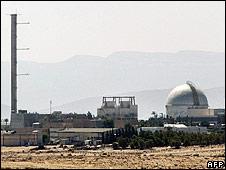Israel deflects pressure on nuclear weapons
- Published

Israel's Dimona nuclear plant is understood to be the source of plutonium for the country's nuclear weapons
As the UN conference on nuclear non-proliferation draws to a close, the most contentious area remains a region with no nuclear power stations, and no country which has declared that it has nuclear weapons: the Middle East.
There have been renewed efforts, at the conference, to have the Middle East declared a "nuclear-free zone". But such a push is drawing stiff opposition from Israel and its allies.
Israel is one of only four states (along with North Korea, India and Pakistan) not to have signed the Nuclear Non-Proliferation Treaty. It is widely believed to have atomic bombs, although there has never been any certainty or clarity about Israel's nuclear capabilities.
The single whistle-blower there was, Mordechai Vanunu, paid a heavy price. He passed details to the Sunday Times newspaper about the highly secret nuclear research facility he worked at, next to the southern Israeli town of Dimona. After being snatched by Israeli agents abroad, in 1986, he spent 18 years in prison.
But the global consensus has overtaken the official Israeli refusal to confirm or deny whether the country holds nuclear weapons. Only this week, Henry Kissinger, the former National Security Adviser and Secretary of State to two US presidents, spoke, on the ДѓЯѓДЋУН, about "Israeli nuclear weapons".
'Pressure premature'
Uzi Even worked at the Dimona nuclear facility back in the 1960s. He is now a professor of chemistry at Tel Aviv University.
Mr Even will not talk about what Israel's military nuclear capability might be, but defence analysts at the London-based Jane's Group assess that Israel has enough fissile material for between 100 and 300 warheads.
Mr Even argues, though, that Israel's policy of nuclear ambiguity - essentially never confirming their existence, but allowing others to believe that Israel has nuclear weapons - has in the past proved very worthwhile.
Whatever pressure might be exerted at the NPT conference in New York, Mr Even says that talk of a nuclear-free Middle East is premature.
His view on Israel's need for nuclear weapons is common in Israel and goes some way to explaining Israeli attitudes on the issue: "There is no country in the world like Israel, which feels as threatened as Israel.
"And there is no country in the world which has any justification to keep nuclear weapons, except for Israel.
"It would be very foolish to ask us to disarm, because we won't. I am at the age where the Holocaust is very, very fresh in my memory."
But at this point, Mr Even departs from the Israeli establishment view. He says that the posture of the past - nuclear ambiguity - belongs in the past.
The Dimona reactor is, he says, reaching the end of its life, now that it is more than 40 years old, and should be shut down. There is also such a widespread belief, around the world, that Israel has nuclear weapons, there is no further need for nods and winks.
And Israel, he argues, needs access to new nuclear technology. Climate change demands that Israel build a nuclear power station, perhaps in a joint project with Jordan. All of which means that "damage from (nuclear) ambiguity outweighs its benefit".
'Safe for conventional war'
There would be a further benefit, Mr Even argues, to Israel now signing the nuclear non-proliferation treaty. It would force Iran to cede the moral high ground over its own nuclear ambitions.
But Iran is also one of the big reasons why the Israeli government has no plans to change its nuclear policy right now.
Dore Gold is an Israeli former ambassador to the United Nations, and president of the Jerusalem Centre for Public Affairs. He says that not just Iran, but Iraq, Libya and Syria have all pursued a military nuclear capability, despite being signatories to the NPT.
As Dore Gold puts it, making Israel sign, would just "make the region safe for conventional war".
Having Israel change its posture of nuclear ambiguity, he says, "would satisfy a small community of arms control experts in Washington and London, but it might leave the Middle East a much more dangerous place".
And that is why the Israeli government insists that the time to push for a nuclear-free Middle East is only after the region is covered by a comprehensive peace agreement.
At the moment, such a goal appears to belong in the category of Very Long-term Ambition.